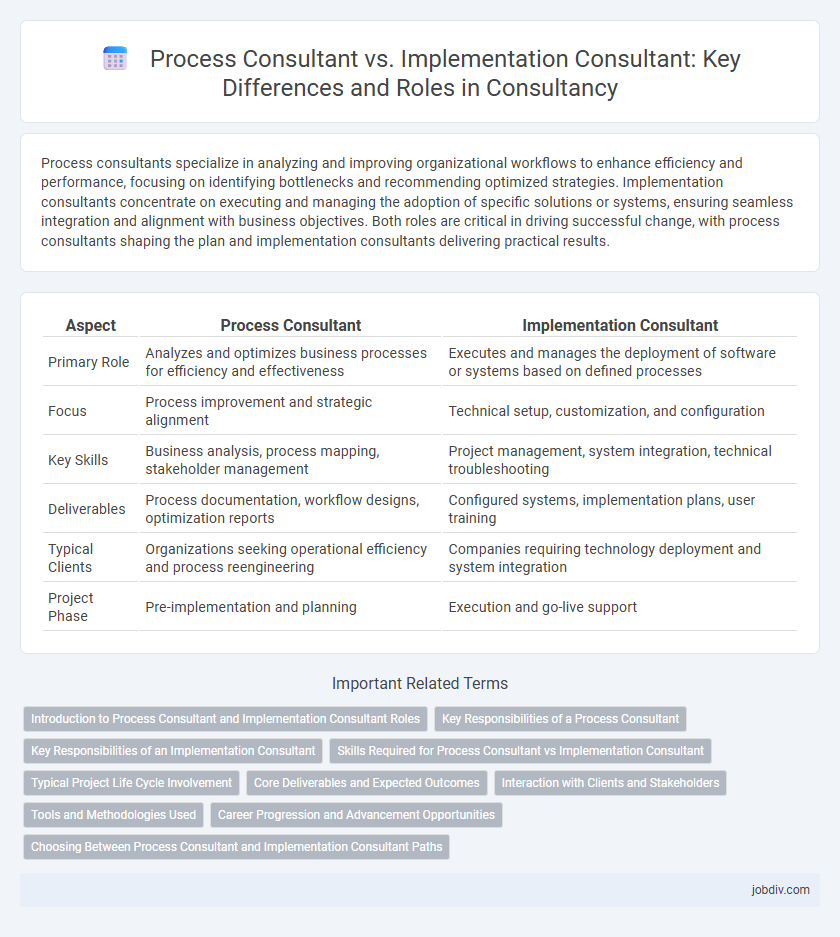Process consultants specialize in analyzing and improving organizational workflows to enhance efficiency and performance, focusing on identifying bottlenecks and recommending optimized strategies. Implementation consultants concentrate on executing and managing the adoption of specific solutions or systems, ensuring seamless integration and alignment with business objectives. Both roles are critical in driving successful change, with process consultants shaping the plan and implementation consultants delivering practical results.
Table of Comparison
| Aspect | Process Consultant | Implementation Consultant |
|---|---|---|
| Primary Role | Analyzes and optimizes business processes for efficiency and effectiveness | Executes and manages the deployment of software or systems based on defined processes |
| Focus | Process improvement and strategic alignment | Technical setup, customization, and configuration |
| Key Skills | Business analysis, process mapping, stakeholder management | Project management, system integration, technical troubleshooting |
| Deliverables | Process documentation, workflow designs, optimization reports | Configured systems, implementation plans, user training |
| Typical Clients | Organizations seeking operational efficiency and process reengineering | Companies requiring technology deployment and system integration |
| Project Phase | Pre-implementation and planning | Execution and go-live support |
Introduction to Process Consultant and Implementation Consultant Roles
Process Consultants analyze and optimize business workflows to enhance efficiency and ensure alignment with organizational goals. Implementation Consultants focus on deploying technological solutions and managing change to integrate new systems seamlessly within existing processes. Both roles require strong analytical skills and collaboration with stakeholders to drive successful transformation initiatives.
Key Responsibilities of a Process Consultant
A Process Consultant specializes in analyzing, designing, and optimizing business processes to enhance efficiency and align with organizational goals. Key responsibilities include conducting process assessments, identifying bottlenecks, facilitating stakeholder workshops, and recommending process improvements based on data-driven insights. They work closely with cross-functional teams to ensure processes are standardized, compliant, and scalable before technology implementation.
Key Responsibilities of an Implementation Consultant
An Implementation Consultant specializes in executing and integrating solutions within client environments, ensuring systems are configured correctly, tested, and deployed effectively. Key responsibilities include managing project timelines, providing technical training to end-users, and troubleshooting post-deployment issues to optimize system performance. This role demands close collaboration with stakeholders to align implementation strategies with business objectives and deliver measurable outcomes.
Skills Required for Process Consultant vs Implementation Consultant
Process Consultants require strong analytical skills, expertise in process mapping, and proficiency in identifying inefficiencies to design optimized workflows. Implementation Consultants need technical knowledge, project management capabilities, and hands-on experience in system integration to ensure successful deployment. Both roles demand excellent communication skills and the ability to collaborate across cross-functional teams.
Typical Project Life Cycle Involvement
Process consultants typically engage during the project initiation and analysis phases, focusing on diagnosing existing workflows and designing optimized processes aligned with strategic goals. Implementation consultants become more involved during the deployment and stabilization phases, ensuring technical solutions are correctly configured, integrated, and operationalized according to the process designs. Both roles collaborate during training and transition but maintain distinct responsibilities aligned with their expertise in process design versus technical execution.
Core Deliverables and Expected Outcomes
Process Consultants specialize in analyzing and optimizing business workflows to enhance efficiency, ensuring alignment with organizational goals through detailed process mapping and reengineering. Implementation Consultants focus on deploying technology solutions and managing change by overseeing system setup, user training, and post-implementation support to guarantee seamless adoption. Core deliverables for Process Consultants include process documentation and improvement roadmaps, while Implementation Consultants deliver configured systems and operational training materials, both driving measurable improvements in productivity and user satisfaction.
Interaction with Clients and Stakeholders
Process Consultants deeply engage with clients and stakeholders to analyze and optimize workflows, ensuring alignment with organizational goals. They facilitate collaborative discussions to identify pain points and design tailored process improvements. Implementation Consultants focus on translating these optimized processes into practical solutions, coordinating with technical teams and stakeholders to ensure seamless adoption and minimal disruption.
Tools and Methodologies Used
Process Consultants leverage tools like process mapping software, Six Sigma, and Lean methodologies to analyze and optimize workflows for efficiency and quality. Implementation Consultants focus on project management platforms, ERP systems, and agile frameworks to ensure successful deployment and adoption of new solutions. Both roles utilize data analytics tools, but their methodologies differ, with Process Consultants emphasizing continuous improvement and Implementation Consultants prioritizing execution and change management.
Career Progression and Advancement Opportunities
Process Consultants specialize in analyzing and optimizing business workflows, offering a strong foundation in strategic thinking and problem-solving skills that lead to senior advisory roles or management positions within consultancy firms. Implementation Consultants focus on executing solutions and managing technology deployments, which often propels them toward project management, technical leadership, or operational management careers. Career advancement for Process Consultants typically involves moving into business design or transformation roles, while Implementation Consultants may advance by gaining expertise in specific technologies or industries, enhancing their value as solution architects or program directors.
Choosing Between Process Consultant and Implementation Consultant Paths
Choosing between a Process Consultant and an Implementation Consultant depends on organizational goals and project requirements. Process Consultants specialize in analyzing and optimizing business workflows to enhance efficiency and align operations with strategic objectives. Implementation Consultants focus on executing solutions, managing change, and ensuring successful deployment of systems or processes within established frameworks.
Process Consultant vs Implementation Consultant Infographic

 jobdiv.com
jobdiv.com